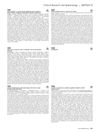 124 citations,
August 1990 in “British Journal of Dermatology”
124 citations,
August 1990 in “British Journal of Dermatology” Diffuse alopecia in women may be related to androgens and iron deficiency, and basic hormone and nutrient screening is useful.
 95 citations,
November 2018 in “Australasian journal of dermatology”
95 citations,
November 2018 in “Australasian journal of dermatology” Alopecia areata treatment varies, with no optimal method established yet.
 September 2019 in “Journal of Investigative Dermatology”
September 2019 in “Journal of Investigative Dermatology” Retinol significantly reduces neck wrinkles.
 153 citations,
March 2017 in “Endocrine”
153 citations,
March 2017 in “Endocrine” Male pattern baldness involves genetics, hormones, and needs better treatments.
 40 citations,
July 2008 in “Drug Discovery Today”
40 citations,
July 2008 in “Drug Discovery Today” Current treatments for male pattern baldness include minoxidil and finasteride, with new options being developed.
 9 citations,
September 2016 in “Dermatologic Surgery”
9 citations,
September 2016 in “Dermatologic Surgery” New LPP subtype affects vellus hairs, mimics AGA, and needs biopsy for diagnosis.
 38 citations,
October 1996 in “Dermatologic Clinics”
38 citations,
October 1996 in “Dermatologic Clinics” Certain hormone treatments can improve acne and related conditions in women.
 May 2015 in “Hair transplant forum international”
May 2015 in “Hair transplant forum international” Androgenetic alopecia causes hair loss by shrinking hair follicles due to androgens, with the connection between the muscle and hair follicle determining if the loss is reversible.
1 citations,
March 2021 in “CRC Press eBooks” Oral minoxidil may be a better treatment for hair loss than topical minoxidil.
 42 citations,
August 2013 in “International Journal of Women's Health”
42 citations,
August 2013 in “International Journal of Women's Health” Female pattern hair loss is caused by multiple factors and while treatments like topical minoxidil, hormone therapy, and low-level light therapy can help, none can fully cure it.
 8 citations,
February 2022 in “Journal of Clinical Medicine”
8 citations,
February 2022 in “Journal of Clinical Medicine” Many COVID-19 patients experience temporary hair loss after infection, not linked to infection severity or treatment.
 3 citations,
June 2023 in “Medicines”
3 citations,
June 2023 in “Medicines” Some antiseizure medications can cause reversible hair loss, with valproate, lamotrigine, and carbamazepine being the most common.
1 citations,
July 2022 in “JEADV Clinical Practice” New and existing treatments for hair loss show promise, with some being more effective for men and others for women.
 January 2023 in “Dermatologic Therapy”
January 2023 in “Dermatologic Therapy” The nutritional supplement Pilopeptan® WOMAN improved hair growth and thickness in women with hair loss.
27 citations,
January 2017 in “Indian Dermatology Online Journal” PRP injections can help increase hair density and thickness in men with hair loss.
 1 citations,
July 2017 in “Clinical research in dermatology”
1 citations,
July 2017 in “Clinical research in dermatology” Hair loss, known as Androgenetic Alopecia, is often caused by hormones and can be diagnosed using noninvasive techniques. Treatments include topical minoxidil and oral finasteride, with new treatments being explored. There may also be a link between this type of hair loss and heart disease risk.
 1 citations,
February 2017 in “MOJ bioequivalence & bioavailability”
1 citations,
February 2017 in “MOJ bioequivalence & bioavailability” Treating hair loss effectively may require a multi-sided approach, using different treatments together, and topical treatments could be more effective and safer than oral ones.
 July 2024 in “Journal of Cosmetic Dermatology”
July 2024 in “Journal of Cosmetic Dermatology” Fractional laser therapy is a promising, effective, and minimally invasive treatment for hair loss.
 November 2023 in “Stem cells and cloning”
November 2023 in “Stem cells and cloning” A new treatment using stem cell-conditioned media significantly improved hair growth in people with temporary hair loss.
January 2022 in “Indian journal of drugs in dermatology” Oral minoxidil helps with hair growth but needs more research to fully understand its effectiveness and safety.
 45 citations,
April 2019 in “International Immunology”
45 citations,
April 2019 in “International Immunology” The study concluded that immune cells attacking hair follicles cause hair loss in alopecia, with genetics and environment also playing a role, and highlighted the potential of certain treatments.
 4 citations,
October 2018
4 citations,
October 2018 Hair loss in children is often caused by scalp infections, immune disorders, hair pulling, stress, and requires careful treatment due to emotional effects.
 2 citations,
April 2022 in “Indian Journal of Dermatology, Venereology and Leprology”
2 citations,
April 2022 in “Indian Journal of Dermatology, Venereology and Leprology” Platelet-rich plasma is a promising and safe treatment for increasing hair density and thickness in women with chronic telogen effluvium.
 November 2024 in “Clinical Cosmetic and Investigational Dermatology”
November 2024 in “Clinical Cosmetic and Investigational Dermatology” Rosemary oil may effectively treat hair loss with fewer side effects, but more research is needed.
 September 2024 in “Archiv Euromedica”
September 2024 in “Archiv Euromedica” Trichoscopy is a quick, accurate, and non-invasive method to diagnose and treat non-scarring hair loss.
 January 2024 in “Medicine”
January 2024 in “Medicine” Hypothyroidism is often linked to the hair loss condition telogen effluvium.
 November 2023 in “Expert Opinion on Pharmacotherapy”
November 2023 in “Expert Opinion on Pharmacotherapy” Finasteride and dutasteride are effective in treating male hair loss but can cause sexual side effects and birth defects.
March 2023 in “Clinical, Cosmetic and Investigational Dermatology” Spironolactone can effectively treat hair loss with manageable side effects.
 November 2024 in “Health Science Reports”
November 2024 in “Health Science Reports” Light/laser therapy can effectively increase hair density in some types of alopecia, especially androgenic alopecia and alopecia areata.
 September 2024 in “Skin Appendage Disorders”
September 2024 in “Skin Appendage Disorders” Tofacitinib helped a woman regrow her hair without relapses after other treatments failed.

























